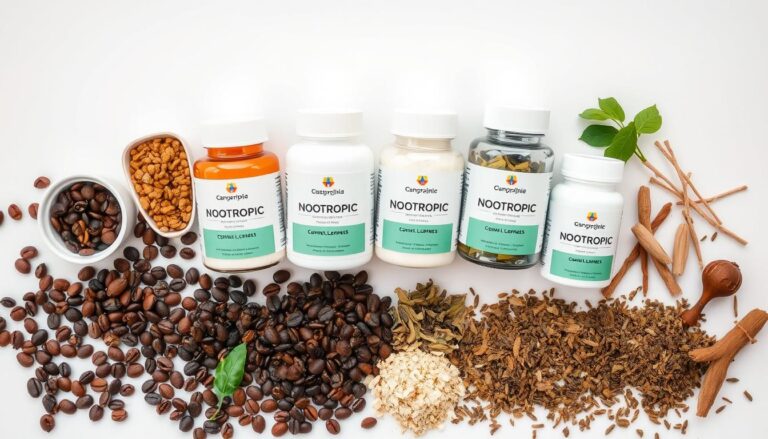- Understanding Nootropics and Their Role in Sleep Improvement
- What Are Nootropics?
- How Do Nootropics Improve Sleep?
- Enhancing Neurotransmitter Function
- Reducing Anxiety and Stress
- Popular Nootropics for Sleep
- 1. L-Theanine
- 2. Ashwagandha
- 3. GABA
- 4. Melatonin
- 5. Valerian Root
- 6. Magnesium
- The Science Behind Nootropics for Sleep
- Neurotransmitter Regulation
- Adaptogenic Benefits
- Efficacy of Melatonin
- Safety and Side Effects of Nootropics
- Common Side Effects
- Dosage Considerations
- Consulting a Healthcare Professional
- How to Incorporate Nootropics into Your Sleep Routine
- Creating a Wind-Down Routine
- Timing is Everything
- Combining Nootropics Wisely
- The Future of Nootropics and Sleep
- Innovative Combinations
- Broader Acceptance
- Personalized Approaches
- Conclusion
- Frequently Asked Questions
- 1. What are nootropics?
- 2. Can nootropics help with insomnia?
- 3. Are nootropics safe for everyone?
- 4. How long does it take for nootropics to work?
- 5. Can I combine nootropics?
- 6. Do nootropics have side effects?
- 7. How can I incorporate nootropics into my sleep routine?
- 8. Are there natural nootropics available?
- 9. How do I choose the right nootropic for sleep?
- 10. Is there ongoing research on nootropics for sleep?
- References
Understanding Nootropics and Their Role in Sleep Improvement
In today’s fast-paced world, many people struggle with getting quality sleep. Stress, lifestyle choices, and various distractions affect our ability to rest well. One emerging solution is nootropics. These substances, often called “smart drugs,” promise enhancements in mental function. However, many don’t realize that certain nootropics can also help improve sleep quality.
Nootropics for sleep represent an exciting field that combines cognitive enhancement with better rest. By understanding how these compounds work, people can find effortless solutions for better sleep. Let’s explore the fascinating relationship between nootropics and sleep improvement.
What Are Nootropics?
Nootropics are substances that may enhance cognitive function, memory, creativity, or motivation in healthy individuals. The term originates from the Greek words “noos,” meaning “mind,” and “tropein,” meaning “to turn.” While many people associate nootropics with increased alertness and focus, the right nootropic can also promote relaxation and restful sleep.
Nootropics can be synthetic or natural. Some well-known examples include caffeine, L-theanine, and racetams. While stimulants often come to mind, many natural compounds offer calming effects. In recent years, researchers have focused on understanding how specific nootropics can improve sleep quality while also benefiting cognitive function.
Understanding how these compounds work requires looking closely at their effects on the brain’s neurotransmitters. Neurotransmitters are molecules that transmit signals between neurons. They play a crucial role in mood regulation, sleep cycles, and cognitive functions.
How Do Nootropics Improve Sleep?
Nootropics can improve sleep in various ways. Some help by regulating essential neurotransmitters like GABA, serotonin, and melatonin. Moreover, they can reduce anxiety and promote relaxation.
Enhancing Neurotransmitter Function
Many nootropics work by boosting the levels of neurotransmitters that promote sleep. For instance, GABA is known for its calming effects. Supplements that increase GABA levels may help promote a quicker and deeper sleep. Other nootropics enhance serotonin production, which plays a critical role in sleep regulation.
Additionally, some nootropics help increase melatonin levels. Melatonin is a hormone that signals the body when it’s time to sleep. By promoting these neurotransmitters, nootropics can help you fall asleep faster and improve sleep quality.
Reducing Anxiety and Stress
Chronic stress and anxiety often lead to sleepless nights. Fortunately, certain nootropics effectively combat these issues. By promoting relaxation and reducing anxiety, these compounds can create an ideal environment for restful sleep.
For example, L-theanine, found in green tea, helps reduce stress levels without sedating the user. This calming effect allows you to relax, making it easier to drift off to sleep.
Popular Nootropics for Sleep
Various nootropics can enhance sleep quality. Let’s look at some popular options and their benefits.
1. L-Theanine
L-theanine is an amino acid primarily found in green tea. This compound promotes relaxation by increasing levels of GABA, serotonin, and dopamine. It helps reduce anxiety without causing drowsiness, making it perfect for those looking to wind down before bed.
2. Ashwagandha
Ashwagandha is an ancient herb long used in Ayurvedic medicine. It’s known for its adaptogenic properties, helping the body manage stress. It can also improve sleep quality by lowering cortisol levels, making it easier to drift off.
3. GABA
GABA (gamma-aminobutyric acid) is a neurotransmitter that inhibits nerve transmission in the brain. It plays a crucial role in promoting relaxation and reducing anxiety. GABA supplements can help you fall asleep faster by calming an overactive mind.
4. Melatonin
Melatonin is the body’s natural sleep hormone. Supplementing with melatonin can help regulate sleep-wake cycles, especially in those with irregular bedtime patterns. It is especially beneficial for individuals suffering from insomnia or jet lag.
5. Valerian Root
Valerian root has been used for centuries to address sleep issues. It may improve sleep quality by increasing GABA levels in the brain. Moreover, it helps reduce the time it takes to fall asleep.
6. Magnesium
Magnesium plays a vital role in promoting sleep. This essential mineral helps regulate neurotransmitters that are involved in sleep. It can also reduce insomnia symptoms.
The Science Behind Nootropics for Sleep
Understanding the science behind the effectiveness of nootropics for sleep provides a clearer picture of how they can help you. Research supports the use of some natural compounds for improved sleep quality and cognitive function.
Neurotransmitter Regulation
Many studies have shown that compounds like GABA and serotonin play crucial roles in sleep regulation. For instance, a study indicated that increasing GABA levels could help reduce nighttime wakefulness and improve overall sleep quality.
Adaptogenic Benefits
Nootropics such as ashwagandha offer adaptogenic benefits, helping the body respond better to stress. Stress management is essential for anyone struggling with sleepless nights. Research shows that people who manage stress effectively experience better sleep outcomes.
Efficacy of Melatonin
Numerous studies have documented the sleep-promoting effects of melatonin. Research suggests that melatonin supplementation can significantly reduce the time it takes to fall asleep, especially in individuals with disrupted circadian rhythms.
Safety and Side Effects of Nootropics
While many nootropics offer promising benefits, it’s essential to consider their safety and potential side effects. Not all nootropics are suitable for everyone, and reactions can vary.
Common Side Effects
Some nootropics come with mild side effects. For instance, L-theanine is generally well-tolerated, but some individuals may experience dizziness. Melatonin can cause daytime drowsiness in some people, especially at higher doses.
Dosage Considerations
Appropriate dosage is key when using nootropics for sleep. Low doses often have fewer side effects and can still be effective. It’s wise to start with a smaller dose and gradually increase it if needed.
Consulting a Healthcare Professional
Before trying any new supplement, consult a healthcare professional. They can offer personalized advice based on your health conditions and any medications you may currently be taking. This step ensures your safety while exploring nootropic options.
How to Incorporate Nootropics into Your Sleep Routine
Integrating nootropics into your nighttime routine can be straightforward. Follow these steps to optimize your bedtime for restful nights.
Creating a Wind-Down Routine
Begin by establishing a consistent wind-down routine. This can include dimming lights, reading a book, or practicing relaxation techniques. Incorporating nootropics at this time can amplify their benefits.
Timing is Everything
When you choose to take nootropics is crucial. For instance, melatonin should ideally be taken 30-60 minutes before bedtime. L-theanine can be taken during the day to reduce anxiety while still preparing you for a restful night.
Combining Nootropics Wisely
Some nootropics work well together. For example, combining L-theanine with caffeine can enhance focus during the day without causing sleep disturbances later. Similarly, melatonin and valerian root can create a powerful synergy for improved sleep quality.
The Future of Nootropics and Sleep
As more research emerges, the future of nootropics for sleep looks promising. New compounds and formulations are likely to be developed. This will broaden the options available for anyone looking to improve their sleep quality.
Innovative Combinations
Future formulations may combine several nootropic compounds. This can lead to greater effectiveness, targeting both cognitive enhancement and sleep support. Creative combinations can also minimize side effects.
Broader Acceptance
As public awareness about nootropics increases, more people will likely explore their options for sleep improvement. Acceptance among healthcare professionals can also encourage individuals to consider these solutions.
Personalized Approaches
Advancements in science may lead to personalized nootropic solutions tailored to individual sleep needs. This level of customization could revolutionize sleep support, catering to specific health concerns and lifestyle choices.
Conclusion
In our quest for better sleep, nootropics present effortless solutions worth exploring. With options ranging from L-theanine to melatonin, individuals can find effective ways to enhance their sleep quality while also enjoying cognitive benefits.
Taking the time to understand these compounds can lead to improved rest and a more productive life. The relationship between nootropics and sleep is complex, but the potential benefits are undeniable. As the research progresses, you’ll find new, practical solutions for achieving the restful nights you deserve.
Frequently Asked Questions
1. What are nootropics?
Nootropics are substances that may enhance cognitive function and mental performance in healthy individuals, and some also promote sleep.
2. Can nootropics help with insomnia?
Yes, certain nootropics, like melatonin and valerian root, can help improve sleep quality and reduce insomnia symptoms.
3. Are nootropics safe for everyone?
While many nootropics are safe, individual responses may vary. It’s wise to consult a healthcare professional before starting any new supplement.
4. How long does it take for nootropics to work?
The time it takes for nootropics to work varies by substance. For example, melatonin typically takes 30-60 minutes to kick in.
5. Can I combine nootropics?
Yes, many nootropics can be combined for enhanced effects. However, consult a healthcare professional for personalized advice.
6. Do nootropics have side effects?
Some nootropics may have mild side effects. For example, melatonin can cause daytime drowsiness in some individuals.
7. How can I incorporate nootropics into my sleep routine?
Establish a consistent wind-down routine and take nootropics at appropriate times to enhance their benefits.
8. Are there natural nootropics available?
Yes, many natural nootropics exist, including L-theanine, ashwagandha, and valerian root.
9. How do I choose the right nootropic for sleep?
Consider your specific sleep issues, consult a healthcare provider, and start with a low dose to test effectiveness.
10. Is there ongoing research on nootropics for sleep?
Yes, ongoing research continues to explore new nootropics and formulations for improved sleep quality and cognitive performance.
References
1. Nootropics and Sleep: The Science Behind Cognitive Enhancers
2. Effects of Melatonin on Sleep – A Comprehensive Review
3. L-Theanine: A Key Ingredient for Stress Relief and Sleep
4. Natural Sleep Aids: Valerian and Ashwagandha
5. Magnesium’s Role in Sleep Quality



